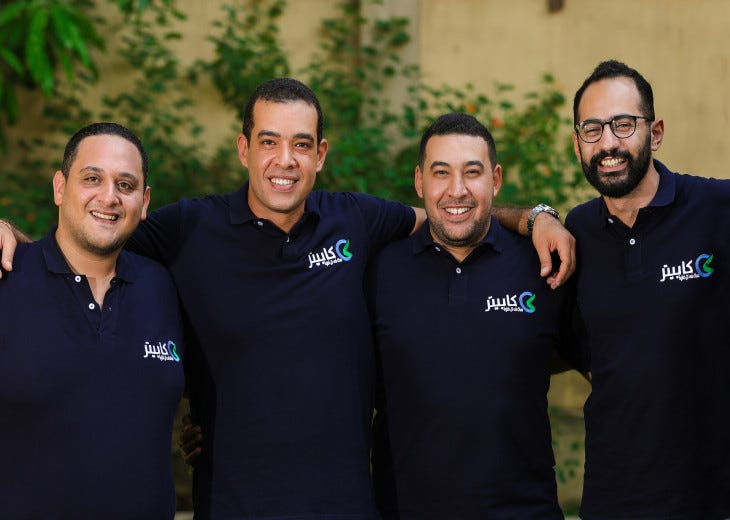MSA Capital expands its increasing presence in Egypt. After previously investing in Egyptian startups Homzmart, SWVL, Flextock, Nowpay, Cassbana, the China-based venture capital firm has led a $33 million Series A funding round in Cairo-based B2B e-commerce startup Capiter. Also joining the VC firm in the latest investment is Quona Capital, with Savola, Shorooq Partners, Foundation Ventures, Accion Venture Lab, and Derayah Ventures, participating.
Capiter intends to expand vertically (in terms of buyer type) and geographically within the next year as a result of the investment. Capiter, in particular, intends to expand its financial services offerings to include payments. The company also intends to expand into new verticals, such as agriculture and pharmaceuticals.

Why The Investors Invested
Investment in MSA Capital was inspired by the traction the company has acquired over time.
According to Mahmoud Nouh, Capiter’s co-founder, Capiter now has over 50,000 merchants and 1,000 sellers. Nouh also added that the company has provided up to 6,000 stock keep units, and is targeting an annualized revenue of $1 billion by next year.
Speaking more on the traction, Ahmed Nouh, one of Capiter’s founders said: “In terms of team members, we have a team of more than 1000 people at the moment, including in warehouses, delivery, etc. So we’ve seen good traction across all board,” he answered when asked about Capiter’s traction.
“Capiter’s embedded finance model, combined with its expertise and strong user engagement, can have a dramatic impact on the financial lives of SMEs, helping them optimize their income which helps communities to thrive,” said Quona co-founder and managing partner Monica Brand Engel in a statement.
“SME supply chain inefficiencies are massive throughout the Middle East. We believe the key blocker is the lack of working capital in the system. Capiter has built an asset-light way to aggregate retailers and suppliers and facilitate credit into the system through a comprehensive multi-product offering such as commerce, credit financing, digital payments, bookkeeping and inventory management for SMEs, leveraging on the ecosystem built by the local banks and financial institutions.” adds Ben Harburg, partner at MSA Capital, a global VC that has invested in fintechs like Nubank and Klarna.
Quona Capital, the round’s co-lead investor, has a history of making B2B e-commerce bets, including Kenya’s Sokowatch. The investment in Capiter expands the firm’s portfolio in that area, as well as its growing presence in the MENA region, with Egypt being its first stop.
The investment is also strategic for some investors, including the Savola Group, which is the largest investor for FMCG products in the MENA region. Mahmoud Nouh said Savola Group will prove pivotal for Capiter’s scaling of its services to countries within the MENA region.
The previous experience of the co-founder is also helpful in attracting investors for Capiter. Co-founder, Ahmed Nouh, has worked in the shipping and logistics industry. He and Mahmoud are both serial business owners. Having worked in the mobility field as the co-founder and COO of Egyptian ride-hailing business SWVL, the latter’s story is well-known. The company, which is one of the few African startups breeding a tech mafia, recently announced a potential SPAC deal worth $1.5 billion. Another co-founder of the company, Ahmed Sabbah, is now the CEO of Telda, an early-stage finance startup.
A Look At What Capiter Does
Mahmoud Nouh and Ahmed Nouh founded Capiter in July 2020. Capiter, according to CEO Mahmoud Nouh, solves difficulties for suppliers and manufacturers in terms of reach and insights. Merchants can order products from FMCGs and wholesalers through Capiter, and the company will deliver them. Capiter also offers retailers fair pricing and matching procedures that allow them to see a wide choice of merchandise.
Read also:IBM Launches Digital4Agriculture Initiative For African Agritech Startups
Capiter’s platform supports over 12 different merchant categories, including mom-and-pop shops, hotels, restaurants, cafes, electronic stores, supermarkets, grocery stores, and catering organizations, all of which have their own unique solutions.
The company’s profits come from small margins on products purchased from manufacturers and sold to retailers. Then there are rebates for suppliers and commissions from merchants’ working capital. Capiter also makes money by providing market research and data services to manufacturers and fast-moving consumer goods companies.
Typically, B2B e-commerce platforms follow one of two models: asset-light or inventory-heavy. Capiter chose a hybrid model, according to Nouh, by making deliveries without owning any trucks in order to ensure scalability and inventory ownership, especially for high-turnover products, which helps the company with high availability and better pricing.
Read also:Revolutionalising Legal Practice With Technology
Capiter claims that machine learning assists these manufacturers in gaining essential insights into the markets they service, the products they sell, and how they compete.
“We’re able to get the data from the products they buy. So we offer them the best solution on what they should sell, at what time and peak seasons, including when are the offerings happening. All of these are customized solutions that we offer,” said Mahmoud Nouh.
The company’s personnel, as well as its offering of financial services through partnerships with banks and its hybrid model, are ways it distinguishes apart in a market crowded with companies like Fatura, Bosta, and MaxAB.
China Egyptian ecommerce Capiter China Egyptian ecommerce Capiter China Egyptian ecommerce Capiter
Charles Rapulu Udoh

Charles Rapulu Udoh is a Lagos-based lawyer who has advised startups across Africa on issues such as startup funding (Venture Capital, Debt financing, private equity, angel investing etc), taxation, strategies, etc. He also has special focus on the protection of business or brands’ intellectual property rights ( such as trademark, patent or design) across Africa and other foreign jurisdictions.
He is well versed on issues of ESG (sustainability), media and entertainment law, corporate finance and governance.
He is also an award-winning writer
